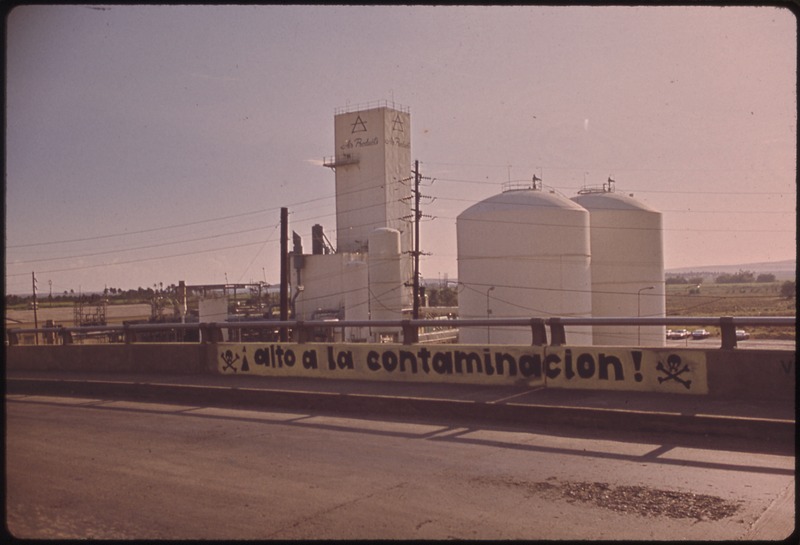- 14 3402-5578
- Rua Hygino Muzy Filho, 737, MARÍLIA - SP
- contato@latinoobservatory.org
 Fonte: U.S. National Archives and Records Administration
Fonte: U.S. National Archives and Records Administration
For years, toxic ash and harmful chemicals have engulfed Salinas in Puerto Rico and the Environmental Protection Agency (EPA) recently announced finding extremely high concentrations of a carcinogenic gas.
The community of Salinas in Puerto Rico has suffered for years from the presence of toxic waste and hazardous substances from thermoelectric and thermal power plants. Residents report serious health problems, including cancer and Alzheimer's disease. However, it was only in 2022 that the situation was revealed as critical, when EPA officials visited the city and announced that Salinas has one of the highest concentrations of ethylene oxide, a highly carcinogenic gas, present in American territory. "We are facing countless battles," said José Santiago, a 74-year-old retiree, in an interview with NBC News.
Salinas and other locations are mobilizing, strengthened by the federal government's commitment to the region. They are demanding strict measures to tackle the pollution and punish those responsible. According to EPAdata, Puerto Rico ranks 22nd out of 56 states and US territories, with an average of 4.2 million pounds of waste managed per square mile. The southern region of Puerto Rico accounts for six of the top 10 municipalities in this category, with Salinas in sixth place.
The high contamination led the Environmental Protection Agency (EPA) to carry out, for the first time, analyzes of groundwater and air in the southeastern region of Puerto Rico. The administrator, Michael Regan, said low-income communities and minorities have suffered unfairly for long periods.
Salinas is a city of about 26,000 inhabitants, of which 28% are self-declared black, and an average household income of $18,000 per year. According to the USCensus, more than half of Salinas' population is classified as poor
The city's location includes the coal-fired power plant, two of the island's largest energy production facilities, and other industries, most notably IDI Caribe Inc., which manufactures thermostable compounds, a component used in large equipment such as refrigerators. According to the EPA, this company is responsible for the largest release of emissions in the city of Salinas.
According to NBC News, the main chemicals released into the atmosphere and water are styrene and ethylene oxide, a potentially carcinogenic gas. However, a study carried out by the Chemical Association of Puerto Rico, in 2021, pointed to the presence of heavy metals related to coal in drinking water of the region. Although these amounts did not exceed the limits set by regulations, the scientists who carried out the study needed to collect samples from individual homes, as the government water and sewer company at the time barred access to the aquifers that residents in the Southeast depend on, according to environmental activist Víctor Alvarado. A law has since been passed requiring the company to provide access for future tests.
The city of Salinas is home to Steri-Tech, a company that uses ethylene oxide to sterilize medical equipment. This colorless, highly flammable gas has a slightly sweet scent and is used to clean an estimated 20 billion medical devices each year. However, long-term or lifetime exposure to the gas can cause lymphoma, breast cancer and other diseases, according to the EPA. Recently, Steri-Tech reported two explosions, which concerned residents and raised questions about the release of toxic chemicals.
Santiago, a retiree who lives a few blocks from Steri-Tech, decided to take steps to minimize his exposure. He closes his windows and has planted avocado trees, small palms and a bougainvillea in an attempt to keep ethylene oxide and other contaminants from entering his home. While these measures have had limited impact, residents are still frustrated that their complaints about contamination have been ignored for years.
Frustrated with the lack of response to the fight against local pollution, Wanda Ríos, a community leader, decided to seek help at the federal level. "I'm not going to waste my time in Puerto Rico anymore," she said in an interview with NBC News. "I will end this on a national scale." She reported that many people in La Margarita, a neighborhood of about 100 people near Steri-Tech, were dying of cancer, including members of the neighborhood association she recently founded.
Twenty Salinas residents gathered to hear the results of air samples collected by the EPA the previous year. It has been announced that extremely high levels of ethylene oxide have been found in some areas. In one, the concentration reached 121 micrograms per cubic meter of air, more than 400 times the US national standard of 0.30 micrograms.
Richard Ruvo, director of air and radiation at the EPA, said that Steri-Tech's equipment filters out a significant amount of emissions, but there is still more to do. The authorities informed that the company is working on the implementation of technologies that will eliminate 99.9% of emissions, but there is no exact forecast for the completion of this process. According to Ruvo, other actions to minimize emissions are being discussed in confidential conversations with the company.
Despite the secret negotiations, the EPA has committed to establishing stricter regulations for toxic air emissions by the end of the year. That move was welcomed by many in Puerto Rico, which has one of the highest asthma rates in the US and whose energy generation is supported 97% by fossil fuel.











